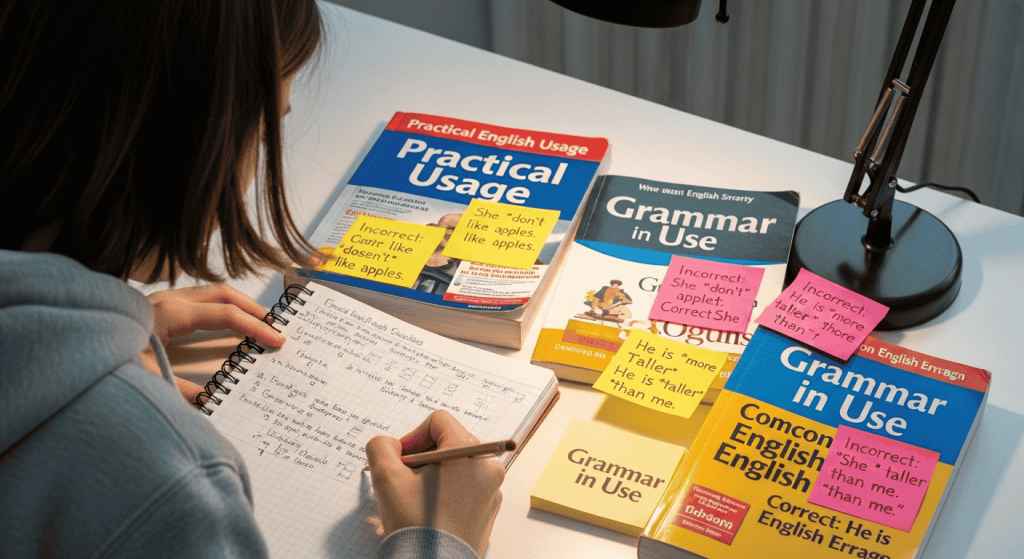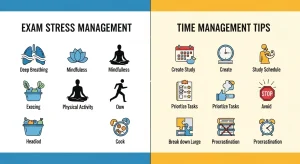Mastering English grammar can be challenging, even for advanced learners. Small errors can affect clarity, reduce confidence, and make your writing or speaking seem unprofessional. This guide covers the 12 most common grammar mistakes in English and offers practical tips to avoid them.
1. Confusing “Your” and “You’re”
Many learners mix up your (possessive) and you’re (you are).
Fix:
-
Your: Shows possession. Example: Your book is on the table.
-
You’re: Contraction for “you are.” Example: You’re doing great!
2. Misusing “Their,” “There,” and “They’re”
These homophones often cause mistakes in writing.
Fix:
-
Their: Possessive. Example: Their house is big.
-
There: Refers to a place. Example: The book is over there.
-
They’re: Contraction of “they are.” Example: They’re coming to the party.
8 Common Mistakes That Kill Your Productivity
3. Subject-Verb Agreement Errors
Incorrect verb forms confuse readers.
Fix:
-
Ensure singular subjects use singular verbs, and plural subjects use plural verbs.
Example: She walks to school. They walk to school.
4. Incorrect Use of “Its” and “It’s”
-
Its: Possessive. Example: The cat licked its paw.
-
It’s: Contraction for “it is” or “it has.” Example: It’s raining outside.
5. Using Double Negatives
Double negatives create confusion and can reverse the intended meaning.
Fix:
-
Avoid combining two negative words.
Incorrect: I don’t need no help.
Correct: I don’t need any help.
6. Confusing “Then” and “Than”
-
Then: Refers to time or sequence. Example: First we eat, then we study.
-
Than: Used for comparison. Example: She is taller than her brother.
How a Student Achieved Fluent English in One Year Without Moving Abroad
7. Misplacing Apostrophes
Apostrophes indicate possession or contractions, but mistakes are common.
Fix:
-
Singular possession: Add ’s (The girl’s bag).
-
Plural possession: Add s’ (The girls’ bags).
-
Contractions: Use apostrophes (don’t, it’s).
8. Overusing Commas
Too many commas can break sentence flow, while missing commas can confuse readers.
Fix:
-
Use commas to separate items in a list.
-
Use commas after introductory phrases.
-
Avoid unnecessary commas in short sentences.
9. Confusing “Affect” and “Effect”
-
Affect: Verb. Example: The weather can affect your mood.
-
Effect: Noun. Example: The new law had a positive effect.
10. Using “Less” vs. “Fewer”
-
Less: For uncountable nouns. Example: I have less sugar.
-
Fewer: For countable nouns. Example: She has fewer books than him.
How a Beginner Learned Spanish in 6 Months Using Only Free Resources
11. Incorrect Use of “Me” and “I”
Many learners mix up subjective and objective cases.
Fix:
-
I: Subject. Example: John and I went to the park.
-
Me: Object. Example: He gave the book to John and me.
12. Sentence Fragments
Incomplete sentences lack a subject, verb, or complete thought.
Fix:
-
Always ensure a subject and predicate are present.
Fragment: Went to the store.
Correct: I went to the store.
Quick Grammar Mistakes Summary Table
| Mistake | Fix Example |
|---|---|
| Your vs You’re | Your book / You’re amazing |
| Their vs There vs They’re | Their house / There is / They’re ready |
| Subject-Verb Agreement | She walks / They walk |
| Its vs It’s | The cat licked its paw / It’s raining |
| Double Negatives | I don’t need any help |
| Then vs Than | First we eat, then study / Taller than |
| Apostrophes | The girl’s bag / don’t |
| Less vs Fewer | Less sugar / Fewer books |
Samsung Galaxy Z Fold 7 Review: Full Specs, Battery Life & Unfolded Innovation
FAQs – Common Grammar Mistakes
Q1: What are the most common grammar mistakes in English?
Common grammar mistakes include confusing your/you’re, their/there/they’re, subject-verb agreement errors, misusing its/it’s, and overusing commas.
Q2: How can I avoid grammar mistakes in English?
Use grammar checking tools, practice regularly, read English texts, and learn the rules for homophones, punctuation, and sentence structure.
Q3: Do grammar mistakes affect professional writing?
Yes, frequent grammar mistakes can reduce clarity, credibility, and professionalism, making it essential to proofread and edit all writing.
Call to Action
Improve your English fluency by avoiding these common grammar mistakes. Start practicing today with guided exercises and resources.











